Ellen and Jim Have a Blog, Too
We are two part-time academics. Ellen teaches in the English department and Jim in the IT program at George Mason University.


_Pallisers 7:14_: our natural business lies in escaping; how world and time separates people, 2 transcripts (3) · 3 September 08
Dear Friends,
The last 2 transcripts of 6 from 7:14 The first is from the penultimate episode. In Bolt’s A Man for all Seasons: In explaining why he says nothing, why he retreats to the country, why he looks for catches in the clauses he is asked to sign, Thomas More is made to say: “Man’s natural business lies in escaping.” So off Lord George (Terence Alexander) and his Jane (Helen Lindsay) go (or is it her George?), solacing each other on their way.
Phineas (Donal McCann), our secondary hero, has done the opposite in his genuine desire to serve, and we are now to see the trouble this nobility of soul and ambition to be high among men brings him; the second is long and nuances of communication go on: it’s Phineas and Madame Max’s (Barbara Murray) first encounter after he has returned from Ireland; she remembers his rejection of her and he remembers his intense frustration and to him dissatisfying marriage. This one important for series as a whole, as it brings before us our secondary hero and heroine and their hitherto unsuccessful or on his part anyway slow-growing love.
FIRST TRANSCRIPT
From Episode 29: Finn’s return
Scene 12: Hartfield Street front room.
[This duet is preceded by the cat-fight of Lizzie Eustace (Sarah Badel) and Mrs Carbuncle, a left-over from Restoration drama where two prime actresses would be given parts where they would amuse the crowd (heavily men) by their fighting. It’s the equivalent of men watching a cock fight, with the added fillip, they have no cocks and are seen as flailing about therefore. The lines are practical though:
Mrs C: Lady Eustace refuses to pay what she owes me
Lizzie: Mrs Carbuncle is trying to throw me out because I won’t allow her to cheat me any longer …
Then they fall to insults, and hitting. Lord George parts them with his cane and father-like scolding words. He does though side with Jane for he finds that Lizzie owes her if not 580 then 500 pounds. He instructs her like a parent to go upstairs pack and leave and congratulates her on her wisdom for doing so, to which she says to him, “she ain’t smart” at all, and she hasn’t been, nor will she be, not in the prudential, humane, or any sense. All she has wanted has been to dump herself on others—perhaps that is part of Raven’s view of women, for in talking of feminism and the oppression of women in an article and by extension Fielding Grey he suggests men have it much worse (they are conscripted, sent to their deaths uselessly) and forced to support women and families to boot. And he presents women in that book as grasping.]
3. Dialogue.
Jane (exultant and trills): “Ruined! and serve you right.” (She’s calling to Lizzie who however no longer can hear.)
George: “Now, dear, she’s got her heath and youth and a quick tongue and a pretty face, and an even prettier annual income” (all along he has been quick-witted in the core practical sense, never over-emotional).
Jane: “I wonder that you didn’t go in for her then.”
George: “Oh at first I liked the look of her a lot but she’s too many for me, Jane” (smile, laughs). [This fits the presentation of men during the time Lizzie is central as emasculated ;it also makes him more appealing at the same time as it makes Jacobi mostly more grating until the end of his scene with Marie Goesler where suddenly he opens up his vulnerability before her.] “She’s too many for any man.” (This is a reference to her promiscuity.)
Jane: “But I’ll tell you what, George, if no one else will have her, Emilius, is going to. He has been with her a lot these last few days, rolling his eyes at her like mill stones.”
George: “Oh good luck to him.”
Jane: “And she’s encouraging him. I suppose she thnks that a clergyman’s friendship will help pull her through this scandal.”
George: “Well, she could be right.”
Jane: “Emilius? I doubt it. They say that he has a wife back in Prague or wherever he comes from.”
George: “Does she know?”
Jane: “Oh hooo. Who cares. She’s sharp enough to see after herself.”
George: “Amen to that. On the question who’s coming to town after us (?), Jane, time’s going on m’dear and just look at those infernal duns” (we know they are outside from Lizzie’s having pointed to them jeeringly to Mrs Carbuncle).
Jane: Well, better them than Lizzie Eustace (looking out window), at least one knows where one is with them. Some of them are positively old friends by now (she waves).
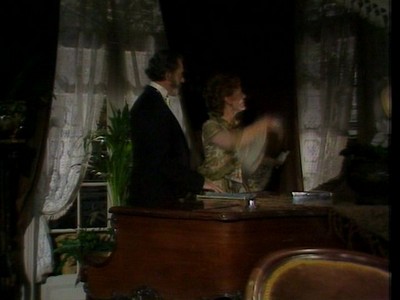
George (warmly, pats her). “That’s the spirit, my dear. I darsay we shall come through this yet. With all that’s been happening, we need a little respite. Italy I think. Would’ja like that?”
Jane: Italy! (claps hands in delight). (then comes down). Oh, no don’t be silly, George. The 500 pounds will have to go to those wolves out there and then we shan’t have a ha-penny between us.”
George. “Yah, I think Jane that Lizzie’s 500 would be rather wasted on those gentleman out there. They’d only be back in a week for more. No. We’ll … um ... we’ll change the check into cash without telling anyone and then just slip quietly away in two or three days time.
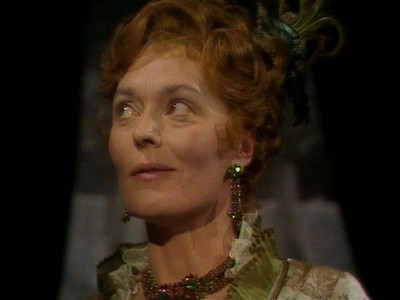
Helen Lindsay transcends the material; she is a seasoned character actress
Jane (close up with a strong amused answering face) “Well I’d never get away with that lot watching.”
George: “Uh, tell them you’re going to church and then join me at Victoria Station.You’ll have to look sharp and travel light but it won’t be the first time, what? (grins).
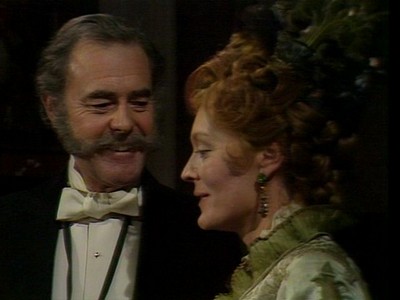
Again there is a look of weight on Lindsay’s face which testifies to her darker memories too
The two laugh.
This way of parting from a pair of characters (in soap opera terminology) set adrift fits Raven’s life goes on feel of the series.
*******************************
SECOND TRANSCRIPT
From Episode 29: Finn’s return
Scene 13: The Palliser’s drawing room in London
This is quite different from Trollope’s presentation of Phineas and Marie’s getting together: again as in the other cases, he can and does move slower; I suppose Raven need dramatic tension and clashes where in Phineas Redux Trollope’s narrator provides the tension. Phineas and Marie meet first at Harrington Hall and are awkward but it is gotten over, and on the hunt when his horse won’t jump and he is thrown she stays with him; gradually they talk and become friends and he visits her at Park Lane once again regularly (1983 Oxford reprinted, Trollope, Phineas Redux, Chs 15, pp. 132-33); their meeting has been engineered by Lady Chiltern (17, “Madame Goesler’s story”) where Madame Max tells about her friendship with the Duke, which he finds “unequal,” it is she who justifies herself to him, and brief scene after Maule leaves (Ch 30, “Regrets”) where again the emphasis has been her inner life, and now is how congenial Phineas finds her because she has made herself so. There is no such scene with Lady Glencora; the duke and duchess come to town, but no salon scenes as end this episode; this is a characteristic invention of Raven (as he has done before); the politics of this book takes place in men’s clubs and the retellings of Trollope of conversations between Lady Glen, her husband and the Duke, insinuations passed without dramatic locations.
1 Establishment shot: Lady Glen (Susan Hampshire) beautifully dressed, making an album from reproductions of what looks like flowers. This she later carries away with her to Lady Mary to whom she has promised to read a story. We get many signs of what a dutiful daughter-in-law she has been to the Duke (Roland Culver) and what a loving mother who spends time with her children she is. This is Palliser combining with Phineas story material.
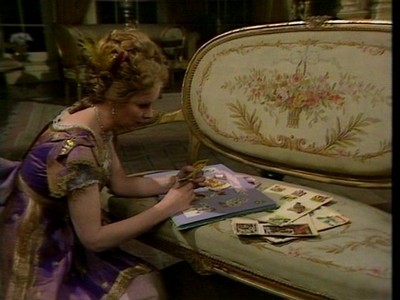
Lady Glen making scrapbook for daughter, Mary
2. Mastershot shows couch (familiar to us now) and the gilded London drawing-room. Collingwood (Maurice Quick) opens the door by one of the gilded columns.
3 Dialogue.
Collingwood. “Mr Phineas Finn (Donal McCann), my lady.”
Lady Glen gets up and glad and welcoming: “Mr Finn, after all this time.”
Phineas. “Lady Glencora” (his voice full). Thank you for your letter” (this obviates the need for them to discuss his marriage and the death of his wife; it’s in a letter).
4 Three way [informative dialogue; filling us in on background politics, there for story to assert Palliser’s respect for and friendship with Finn)
Palliser (Philip Latham) hurries in (his voice heard before we see him): “Oh Finn! (now walking in) “Well, it is pleasant to see you again. Ah! You’re standing at uh Tankerville in the general election so they tell me.”
Phineas. “Yes I go down tomorrow.”
Palliser. “I think you’ve a very good chance now. Growing towns like Tankerville are coming over to us these days and what is more, the nation, at the moment (he goes into his study in the next room and the camera follows), they’re with us. It is either that, or they’ve got tired of Mr Daubeny (picks up papers and a leather-file from his desk) “Mmmme. Ah! (he walks into front room and past Lady Glen and Finn) “If you’ll excuse me [papers shown] [I’ve got?] to get out to the Duke of St Bungay and election tactics, you know.
Lady Glen nods.
Phineas. “Yes of course.”
Palliser (goes to door with sudden serious tone] Well, it’s good to see you back, Finn. Now you’ve been missed (good feeling in tone)
5 Back to dialogue of 2
Lady Glen: “Yes, yes we’ve all missed you.” (They begin to walk a little forward)
Phineas: “How is the Duke?”
Lady Glen: “Old master Phineas, old” (Raven echoes Henry IV Part 2, scene with Shallow and Falstaff)
Phineas: “Well, he has heard the chimes at midnight in his time.”
Lady Glen (hands in her lap, very stiff somehow). “Yes, he’s had his share of the world.”
Phineas. “Oh more than many I’d say.”
Lady Glen. “Yet even his Grace of Omnium has been disappointed in some things” (pat, in comes Marie Goesler)
6 Dialogue of 3
Collingwood at door: “Madame Goesler, my lady.”
Shot of Phineas pausing, drawn look on his face.
Marie (Barbara Murray) comes forward, sees Phineas, stops at door.
Lady Glen: “Marie, [t]here’s Mr Finn, come to join us from Ireland.”
She looks like a tragic figure standing there, half way towards Phineas (this is the still the head-frame for the advertisements used of her).
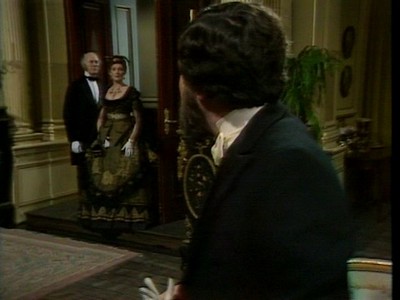
This is in little the technique of the Palliser forced pairing and Burgo and Lady Glen’s separation at the fencing school; two people across a room; at an angle as fits the secondary plot
Then she walks forward briskly, holding out her hand: “Mr Finn, I heard you were back in England. I was very sorry to hear the sad news of your wife.”
Phineas (again face filled with emotion): “Thank you.”
Lady Glen: “Madame Goesler spends much of her time with us and the Duke at Matching.”
We hear something falling in another room, then a child’s agitated voice, and then a distinct “ma-ma!”
7 Dialogue of 4 plus invisible presence of child
Collingwood appears at door, pleading & meaningful look, intense expectant on his face: “My lady, please …”
Lady Glen: (seeing him) “I’m longing to hear your news, but I promised to read Mary a bedtime story, and as you can see she’s determined to hold me to it. A toute a l’heure. (She is also embarrassed and half-glad to run away; she has in her arms the book she had been preparing. They look appalled).
We hear from the other room, child’s voice: “Ma-ma! Ma-ma!” Shot of Collingwood. Lady Glen hurries off.
8 Dialogue of 2.
Marie: “One of us must say something, Mr Finn.”
Phineas: “I was hoping you would begin.”
Marie: “Very well, then. How were things in Ireland with you, Mr Finn?”
Phineas: “The time passed, Madame Max.”
Marie: “You thought of us all, sometimes” (a quiet strained look on her face)
Phineas. “Constantly.”
Marie: “And spoke of us perhaps to your wife” (facing him).
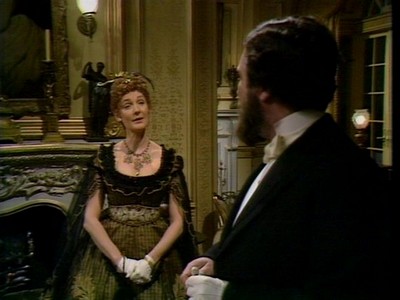
Marie asks Phineas if he and Mary spoke about “them” (herself and others)
Phineas: “No. She would not have understood. [Trollope’s Mary understood and was told of Madame Max and also the politics; interesting, how often Raven infantilizes the women characters where Trollope did not.]
Marie: “And now the poor lady is dead., and you have come back to us.” (she seats herself, looks up at him) “What are your plans?”
Phineas (still seated): “To take up politics again where I left off.”
Marie: “You would hardly be able to do quite that yet I think.”
Phineas: “No, not quite. I shall have to get a seat first. I am standing for Tankerville, you know.”
Marie: “After so long an absence, you will hardly be called to office tomorrow or even the next day, but all will come right in time.”
Phineas: “Time is just what I’m short of, Madame Max. You may have heard that my father died shortly after my wife. I am left temporarily independent, but only temporarily.” [Trollope’s Phineas is presented with an emphasis on daring, and the narrator ironizes his desire to be amid the trumpets and not stay quietly and safely in the small pond of Ireland where he’s a big fish. Raven’s quieter presentation enables viewers to identify more easily.]
Marie: “Have patience, Mr Finn. Patience and all will be well in the end. I have always known you would be lucky in politics in the end, if only because you are so unlucky in love.”
Phineas: “What de’ya mean, unlucky?” (a little belligerent, he is now walking about)
Marie: “Your young wife is dead. Your old flame, Violet Effingham is married to another. And then there is Lady Laura Kennedy, was there not? [all this function as does the early part of the dialogue to set us into the matter of Phineas Redux; a new viewer could also catch up and watch this and further episodes without having seen the earlier ones or read the books] Who is now hiding with her father in Dresden?” [She and he no longer have eye-contact; she looks out at us in effect and he looks nowhere in particular but not at her]
Phineas: “Mr Kennedy will give her no peace if she came back to England.”
Marie (hard face, looking away from Phineas, towards the camera): “Does she enjoy peace in Dresden?”
Phineas: “If she does, that’s all she enjoys, locked away from everything she knows and loves. She’s now pressing me to go to her. So I shall, if I can.”
Marie: “All the way to Dresden, Mr Finn? And what of Mr Kennedy, her husband, what of him?”
Phineas: “Oh what indeed. He just sits up in Loughlinter, counting breadcrusts.”
Marie: “Counting his grievances. He feels himself to be dishonored, Mr Finn. That is what has broken him. They say that his health is bad. Even that his mind is affected.”
He has walked over to the opposite chair and seated himself again.
Phineas: “Oh what misery marriage can cause. I know from my own (deep bitter, unexpected candor here, close up on his face).
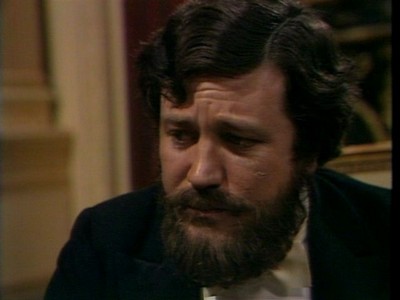
He may also be thinking of the wretched pregnancy, and his wife’s delusionary dreams
Marie (a close up on her face which is averted from his): “Indeed, Mr Finn (whispers this). Then perhaps you should have more care who you marry.”
Phineas: “I had no choice.”
Marie: “Well, choice has been restored to you. The Gods do not often give us a second chance, Mr Finn. Yours begins at Tankerville.”
Phineas (awakened to practicality and the future): “Yes. I must go down very early tomorrow. I have preparations to make.”
Marie: “So.” (she gets up). We will say good night. (She turns and now faces him.)
He gets up slowly. “Please make my excuses to Lady Glencora” (she nods). Good night, Madame Max.”
Marie: “Good night” (we see him moving out of her hearing, near the door). “Phineas” (very soft).
This one is juxtaposed with a scene partly taken from the book, Mr Emilius’s seduction of Lizzie, which we are to feel ends in sex (as did two scenes with Frank) and then a wretched marriage for her, but then like him she seems unable herself to be up to anything else. We’ll see this in our last blog on 7:14.
So next up a concise summary of the episodes of Pallisers 7:14, and some thematic comparison and analysis with Trollope’s Eustace Diamonds and Phineas Redux.
Ellen
See various links and a concise summary of 1:1-3:6, 4:7, 4:8, 5:9, 5:10, 6:11, 6:12, and 7:13.
--
Posted by: Ellen
* * *
Comment
- Lizzie Eustace remains a femme fatale type, young and beautiful throughout her appearances in Trollope. She is as close as he can get to showing someone promiscuous in a middle class novel. We do have Mrs Carbuncle who has mysterious large amounts of money—the implication is she’s kept and by more than one man and supports Lord George de Bruce Caruthers. She has a house she has lodgers in too—we are told. The sort of place she runs is made visible in Miss Mackenzie when Miss Mackenzie goes to live in London and in a lodging house. Quiet sex for money for the women who live there with Mrs Carbuncle getting a cut in the form of rent. I copy and paste a paragraph from my paper on Miss Mackenzie”
The poorer places where Miss Mackenzie has lived are sleazy with illicit sex: When Miss Mackenzie arrives in Littlebath, she feels justified in asking the landlady at the Paragon whether the landlady rents to bachelors. Arundel Street where Miss Mackenzie had lived for many years was a place known for having “bachelors” and single women about who were willing to service their sexual needs. Now in Littlebath with more money, she wants to avoid this sordid reality of everyday English life. Once she becomes poor again, she takes a room in Mrs Buggins’s lodgings where she is aware that masked by the discreet behavior of Mrs Protheroe, the same quiet prostitution is going on (23:303)
The “raucous sexual flavor” of the puns and what Michael Sadleir called the “faintly sordid” ambience of this book highlights its sexual project. For information on Arundel Street,” see the online 1888 Dickens
Dictionary.
I’ll suggest that in the 1970s to a middle class audience the Raven team did not dare go into this suggested reality and that’s another reason the segments are so dull. They bring Mrs Carbuncle before us but don’t explain her. She is a carbuncle, a red sore to Trollope, but she is supporting herself and Lord George.
All the women presented by Trollope in this novel are desperately trying to keep afloat in the real world of Victorian society where in fact men were rarely wonderful protectors of the type the Duke of Omnium, John Grey and Phineas Finn turn out to be. The conscious message is women who are good spend their time arranging flowers and still even in the year 2007 the film adaptations of high status older novels cannot think of giving the actresses anything to do but arrange flowers. But the text tells us a realer hard story. John Stuart Mill knew of whence he spoke, and the married women’s property act was none too soon. The fact that we can see this reality however obscured is important in the novel; Raven’s team is far more antifeminist and obtuse in their approach.
— Elinor Sep 3, 7:01am #
commenting closed for this article
